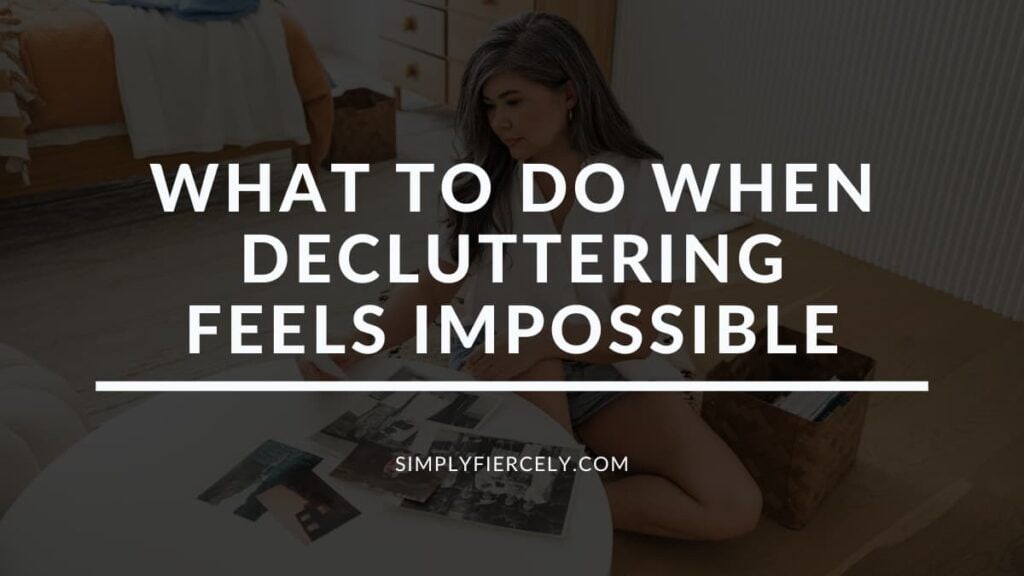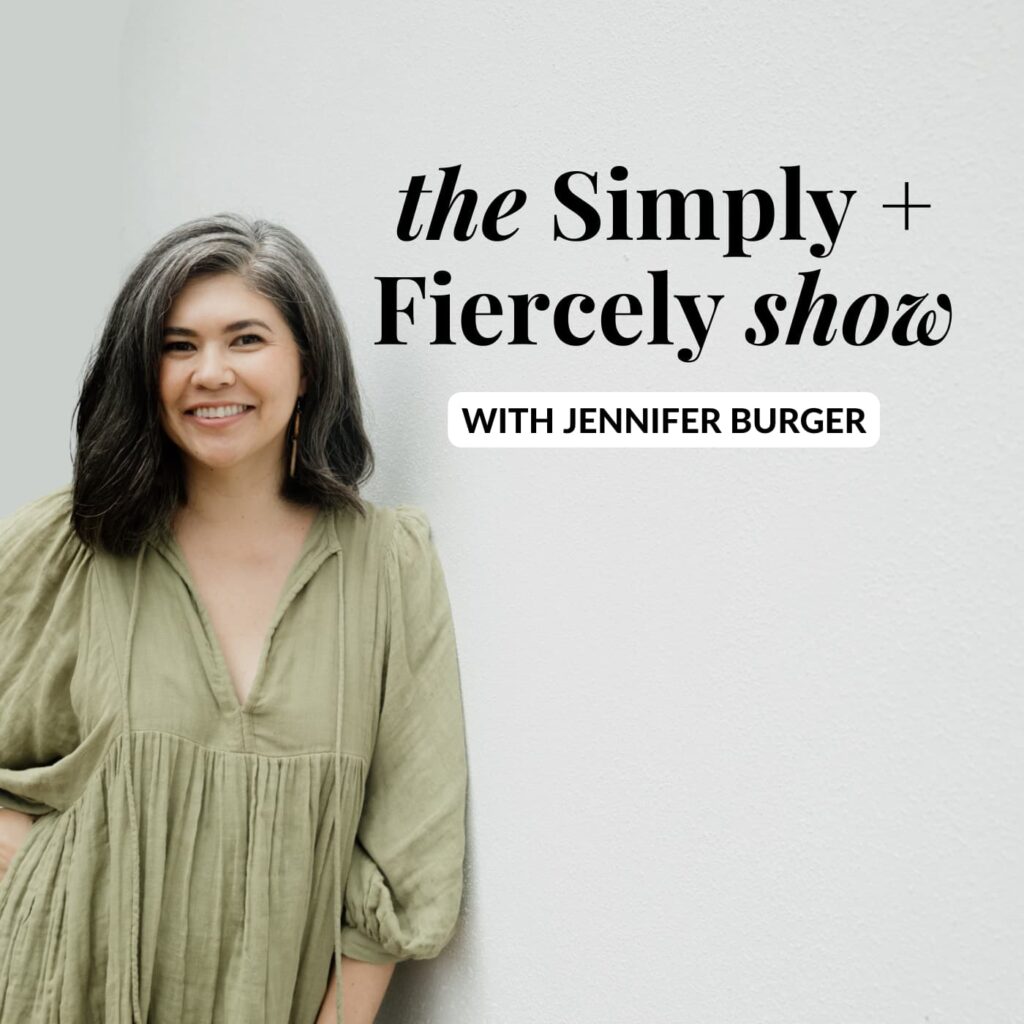I can remember a time when clearing clutter felt impossible.
One memory in particular stands out: sitting on my floor late at night, surrounded by piles of clothes with tears streaming down my face.
I was just so tired.
Tired of my cluttered home, tired of being overwhelmed, tired of being tired, tired of being myself …
I wanted something different, and I suspected decluttering was the way forward. I had read so many blogs and books that made big promises and felt so optimistic at first!
But as time passed, my optimism quickly faded. Decluttering was much more challenging than I expected, and in my head, all I could think was, “What’s wrong with me?”
Or my other favourite thought: “How did I let it get like this?”
If this strikes a chord, please know you are not alone. I’ve worked with hundreds of women from around the world who feel the same way — like decluttering was an impossible task they could never surmount — but for most, this just isn’t true.
Here’s what I know about decluttering, why it feels impossible, and most importantly, how to move forward with letting go.

Understanding Clutter: Why It’s So Hard to Let Go
A quick note before we dive in — everyone’s circumstances are different, and some people need to keep more ”stuff” due to finances, geographic location, and more. One’s ability to weather uncertainty is almost always relative to one’s position in life.
This is why I firmly believe that minimalism is not one-size-fits-all. I invite everyone to consider what “enough” looks like for you and your family instead of chasing arbitrary decluttering goals.
Most people can’t (and don’t want to) live an extreme minimalist lifestyle! But almost everyone can take small steps towards a simpler life.
It’s also worth mentioning that neurodiversity, mental and physical health, and other factors influence your relationship with clutter. The point of this article isn’t to shame anyone but to offer insights into common decluttering challenges.
Related Post: Cluttered House, Cluttered Mind: Why Mental Health Matters
1. You‘re focusing on the wrong problem
When I first started decluttering, I thought it would be a mostly physical job (something like spring cleaning). I just had to put my head down, apply some elbow grease—and boom! My house would be decluttered.
But … that’s not what happened, and it confused me.
Despite my good intentions, decluttering took considerably more time and effort than expected. I also found myself spending a lot of time feeling “stuck”.
When faced with mountains of clutter and doom piles, I found myself mindlessly scrolling on social media or doing anything to avoid what I *should* be doing.
So, of course, I assumed I was the problem.
I was lazy, I was procrastinating, I wasn’t trying hard enough, I was too emotional … you get the idea. Clearly, my lack of motivation was holding me back, and I just needed to work harder and push through.
But it didn’t work, and now I know why.
Decluttering is NOT like spring cleaning, and the problem was not my lack of effort. Instead, it was a lack of curiosity and compassion.
For example, a designer silk blouse I never wore. After reflecting, I realised I kept it because I was insecure about my career success, and owning a designer blouse made me feel better about myself.
It turns out my negative self-talk and diminished sense of self-worth held me back — not my work ethic — and once I realised this, I could declutter. Not by forcing myself to let go but by being kind and changing my stories.
“Success” no longer means wearing designer clothing. Instead, I believe a successful woman wears what she wants and doesn’t worry about what other people think.
(And just so you know — that new belief helped me declutter a lot more than one blouse!)
Summary: Focusing on your relationship with clutter and why it’s so hard to let go is how you work smarter, not harder.
2. Most decluttering advice leaves you feeling overwhelmed
Decluttering is so simple — in theory. All you need to do is sort your stuff into piles.
Too easy, right?
Well … not always.
If you have a lot of stuff, going through hundreds (if not thousands) of items, one by one, is a recipe for failure. Our brains can only make so many quality decisions before they throw in the towel (hello, decision fatigue!).
And if I can share a hard truth?
If you were good at making decisions about what to keep, you probably wouldn’t have so much stuff in the first place.
I say this with compassion because this applies to me too! As a reformed shopaholic who still loves stuff, decluttering once felt impossible …
Until I embraced a simple, repeatable system that reduced overwhelm while allowing space for compassionate curiosity.
I teach this exact method inside my program, Clear Your Clutter, but here are two practical tips you can implement today:
- Begin with the end in mind. Create a detailed vision for your space (how it should look, how it should function, and how you want to feel) so you have something to work towards! Instead of arbitrarily tossing things into piles, you are actively working towards a goal.
- Look for patterns. One of my favourite decluttering tips is to continually learn from your clutter. For example, are there certain dresses you never wear? If so, why is that, and how can you use that information moving forward? (If you don’t wear that dress because it’s yellow, odds are you’re not wearing other things for the same reason!)
These simple shifts will help you stay motivated but, perhaps more importantly, reduce the number of decisions you need to make.
The Simply + Fiercely Show is a podcast for women who want to clear their clutter and create space for freedom and joy. If your life keeps getting bigger—but not better—then it’s time to declutter from the inside out. LISTEN NOW
3. Clutter is often a placeholder for difficult feelings
There’s a common saying in the world of decluttering that goes something like this:
“It’s just stuff, let it go!”
I also used to believe it because it seems logical, right? But after years of experience (my decluttering journey and working with women worldwide), I now know it isn’t true.
Instead, clutter is often a placeholder for difficult feelings.
Think about it: we live in a world where many lack support to deal with challenging emotions. People are working long hours, caring for loved ones, struggling with health problems—and this is just the tip of the iceberg.
Sometimes, we have to “get on with life” because there isn’t time or energy to deal with anything else, and feelings like grief or disappointment get pushed to the wayside.
But they don’t disappear (or at least that’s been my experience). Instead, they lay dormant in old papers, well-loved sweatshirts, and other innocuous items that seem like just “stuff”.
Stuff we can’t let go because there’s still no closure …
It turns out the key to decluttering most items is processing the emotions that are stored inside them. And that’s not possible if we pretend they don’t exist.
This isn’t a simple, one-size-fits-all solution, but to paraphrase Dr Susan David, emotions are signposts. They provide clues to everything in life, including decluttering.
This blog post about decluttering sentimental items provides more insights on tackling this type of clutter!
4. You crave certainty and fear making the wrong decisions
Another reason why clutter clearing can feel impossible is fear of the unknown.
“But what if I need that someday?”
It’s a question that’s almost impossible to answer with complete confidence. You can make an educated guess (if you haven’t worn a pair of shoes in two years, you’re unlikely to wear them again), but I don’t have a crystal ball, and neither do you.
Five years from now, there might come an occasion when you need them, and decluttering regret is always a possibility … and it’s that uncertainty that has so many people stuck with their decluttering.
In the words of Tim Ferris, “Most people will choose unhappiness over uncertainty,” and this is especially true with clutter. The fear of making the wrong decision can be paralysing.
But here’s a perspective that changed everything for me.
You’ll never have 100% certainty when it comes to decluttering. But you can believe in yourself and know that whatever the future holds, you can deal with it.
In other words, one of my top “decluttering secrets” is self-trust.
Yes, it’s true: you might need those shoes, your bread maker, or an extra set of beach towels. But if that happens, I trust you can deal with it.
(And note that ”deal with it” doesn’t always mean ”buy something else”!)
If you’re not sure, try this exercise. The next time you wonder, “What if I need this someday?” switch your question. Ask, “If I needed this someday and didn’t have it, what could I do instead?” and see what happens.
How to Finally Clear Your Clutter
If this article resonates with you, I invite you to check out Clear Your Clutter, my group decluttering program. As a reformed shopaholic turned minimalist who has struggled with all of the above, I teach a heart-centred approach that addresses both the practical and emotional sides of decluttering.
Alternatively, you might want to check out one of these popular articles:
- 5 Decluttering Methods You Haven’t Tried (That Really Work!) — If you’re having a hard time with clutter, try one of these methods in your next decluttering session.
- 20 Simple Things You Can Do To Declutter and Live Minimally — Small tasks you can tackle in an afternoon (because checking things off your to-do list is great motivation to keep going!)
- How to Declutter When You Want to Keep Everything — I’ve worked with a lot of people who want to live with less … but also want to keep everything! If you can relate, this post is for you.
- 5 Things I Wish I Knew Before I Started Decluttering — If I could go back in time, this is what I would tell myself about decluttering. (It would have saved me so much time, energy, and emotional turmoil!)
And don’t forget to download my free Mindful Decluttering guide using the form below!



I hope this is ok to post. What happens when the items are a “want” rather than a “need”? Most of my items would be something you would display. If someone asked me why I can’t let go of it, my answer would be “because I like it”. If I stop liking it, it can go.
Hi Gail! I actually wrote a blog post you might find helpful (It’s about how to declutter when you want to keep everything: https://www.simplyfiercely.com/want-to-keep-everything/) Thanks and take care! Jen